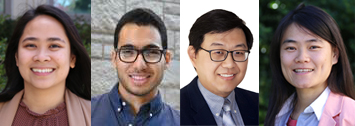Four Assistant Professors Win NSF CAREER Awards

June 8, 2023 - Four UCI engineering faculty - Herdeline Ann Ardoña, Ramin Bostanabad, Kai He and Zhiying Wang – have been recognized this year with Faculty Early Career Development (CAREER) awards from the National Science Foundation. Among the NSF’s most prestigious, the CAREER award supports early career faculty who have the potential to serve as academic role models in research and education.
Ardoña, assistant professor of chemical and biomolecular engineering, will receive $650,000 over four years from the NSF's Division of Materials Research. Her research involves developing a class of materials that could be interfaced with cardiac muscle cells and capable of reporting real-time changes in the heart’s ability to contract through read-outs based on changes in the materials’ optical properties. Ardoña plans to use the proposed materials for assessing the long-term effects of contractile cells on the bulk properties of materials that serve as their scaffolds in vitro, setting the stage for quantitatively visualizing biological forces in real-time and being able to directly assess how environmental parameters affect cardiac function through contractility. In the future, these adaptive materials could be adopted for model platforms used in screening drug cardiotoxicity and investigating mechanisms of debilitating cardiac diseases.
Bostanabad, assistant professor of mechanical and aerospace engineering, will receive $574,000 from the Division of Civil, Mechanical and Manufacturing Innovation to develop composition design methodologies for engineered materials that are crucial to our national health, prosperity and welfare. Composition optimization has two major challenges that dramatically reduce the efficiency of designers: co-existence of multiple uncertainty sources (e.g., lack of data, inaccurate simulations, unknown parameters), and existence of a vast disjoint design space that has both categorical and quantitative features. To address these issues and accelerate the design process, Bostanabad will convert the design problem into a statistical learning one. This conversion uniquely leverages machine learning and enables designers to make informed decisions for resource allocation, uncertainty quantification and anomaly/novelty detection. The impacts of the proposed framework will be demonstrated on an optimal design of complex concentrated alloys that have shown great potential in critical applications involving energy storage, cryogenic operating conditions and more.
The NSF Division of Materials Research has granted $667,000 to He, assistant professor of materials science and engineering, for his project to investigate ceramic materials’ capabilities for use in clean energy technologies. Next-generation solid-state batteries using ceramic solid electrolytes as a medium to conduct ions between positive and negative electrodes can improve the safety and energy density over today’s conventional liquid-based lithium-ion battery technology. However, the ability of ion transport in ceramics is not high enough to make batteries charge fast enough for use in electric vehicles and high-power applications. To solve this critical issue, He plans to study how the material’s structures and interfaces affect the ion conduction under complex electrochemical conditions. “We will use advanced electron microscopy techniques to visualize these fundamental processes on the nanometer scale,” said He. “This is important because the resulting information can be used to guide the development of viable energy storage technologies, enhancing energy security and sustainability.”
Wang, assistant professor of electrical engineering and computer science, will receive $550,000 from the Division of Computing and Communication Foundations to investigate methods of high-density data storage using DNA molecules.
DNA has become an appealing storage medium for its high density and long retention. However, producing the desired DNA molecules, which is called DNA synthesis, is expensive and prevents wider adoption of DNA storage. This project investigates how to represent binary information using the four types of nucleotides (A, T, G, C) for composite DNA storage.
Wang will explore DNA storage channel models, information representation schemes and error correcting schemes that will lead to high storage density and low information error rates. The project will examine information security in order to combat adversarial attacks. With this approach, secret information can be potentially decoded by reading only the mixed DNA strands of multiple storage vessels, instead of reading all vessels for standard DNA, a unique feature compared to traditional storage media. The project will also inspect the identification of a given composite DNA strand from a storage vessel containing many composite strands to facilitate large-scale storage. The results are expected to enable cost-effective, reliable, secure and large-scale information storage.
All four grants include funds for research outcomes to be integrated with educational and outreach activities to benefit educators and students (high school and higher education levels).
– Lori Brandt
